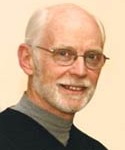I first met Mike Mahoney in the fall of 1988, when I was a beginning graduate student. I had the good fortune to take a reading course with him on the scientific revolution and to attend his undergraduate lectures on the same topic. His brilliant performances in the class vividly brought to life the alien world and intellectual struggles of Copernicus, Galileo, Descartes and Newton. I was also impressed by how Mike conducted our weekly meetings, where I was supposed to come in with questions on the reading assignments. His encouraging pedagogic style still resonates in me. He pretended not to notice my abysmal ignorance and treated my naïve questions with a respect they hardly deserved. When I turned in my final writing assignment Mike responded with great generosity. He wrote me a dense, two-page commentary, which offered much needed, constructive criticism of my over-ambitious attempt to attribute Newton’s achievement to his philosophical outlook.
For the rest of my graduate career, I had ample opportunity to witness Mike’s sharp intellect and the amazing breadth and depth of his knowledge. In the program meetings and colloquia, one could not fail to notice his amazing ability to discuss with ease a bewildering variety of topics.
Towards the end of my graduate studies, I had the privilege to become Mike’s teaching assistant in his course on the history of technology, which ranged from medieval mills to 20th century computers. I then realized that Mike was equally at home in the world of texts and in the world of machines. He taught students (and their fortunate preceptor) how to treat machines as texts and extract from them the intentions of their makers. Mike was no deconstructionist! The various teaching tips he gave me, during our weekly discussions over lunch, proved invaluable in my subsequent career as a teacher.
A few years after my return to Greece, Mike was invited to lecture at my new academic home, the University of Athens. He gave two engaging talks on computational science in the 17th and the 20th centuries, which made a striking impression on faculty and students. Besides his memorable lectures, I recall with nostalgia the pleasant conversations I had with Mike and Jean about their family and travels.
The news of Mike’s untimely passing came as a shock and brought back these and many other memories. It is hard to picture the Princeton program in history of science without him. As a Greek saying goes, may the earth that covers him be light.
